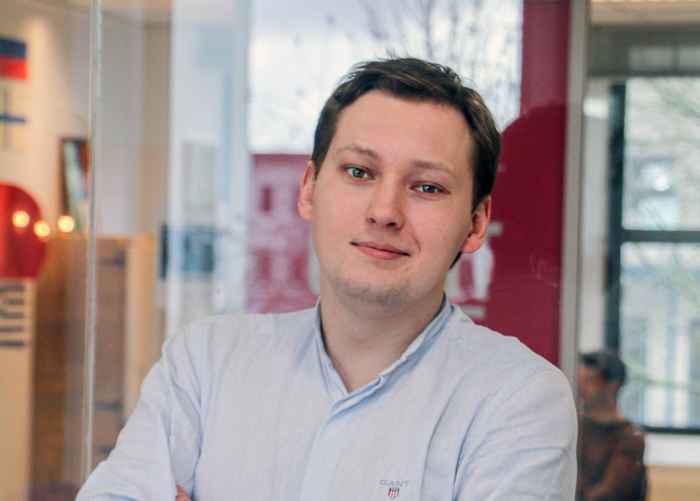Evgeny Mironov: 'An education at any university is exactly what you make of it'

What was your dream job as a child, and what is your dream job now?
When I was 5 or 6, I was really fascinated by the prospect of becoming a firefighter. At this point in life, however, it's way harder to answer that question – the possibilities are endless! I'm currently really excited about improving my data skills, as I think there are a lot of brilliant opportunities in applying data science to various projects that aim to make the lives of billions of people better.
For instance, I want to keep on improving my knowledge regarding data warehousing, setting up pipelines between various data sources (marketing platforms, analytics software, cloud storage (like AWS S3 buckets) and so on) and destinations (data visualisation tools, databases, different tools), what people would refer to as data engineering. Also, I’d like to get more hands-on experience with machine learning, neural networks, text mining, natural language processing and such.
What is your current position, and what do you do?
I work as a Team Lead of Data & Market Research teams at bunq, an Amsterdam-based digital bank that's present in over 30 countries and is growing like crazy. It's a really fast-paced and demanding environment – there's never a boring day! My team consists of 10 young and extremely talented people (mostly data scientists) from all over the world. Our job is to make bunq a truly data-driven business and to ensure that the decisions people make at bunq stem from research and are properly validated by data. We also deploy machine learning models that help optimise our marketing performance and monitor transactions for fraudulent activities, set up analytics to improve our customer experience, provide insights about our target audience, and a lot more!
How did you get your job?
There's no magic story here… a friend of mine sent me the job posting one day – thanks, Anastasia! – I read it and immediately felt that it might be a worthwhile opportunity. Five steps in the recruitment process and 3 weeks later, I had my trial day. I clicked with the company and signed an agreement a few days after that. I really appreciate that bunq showed a genuine interest in my propositions and vision, and I love the fact that I was given a challenging task of building teams from scratch and making them valuable business units.
What do you like most about your job?
It's definitely the freedom I have, both in goal-setting and in the ways to achieve my goals. This is only amplified by how challenging the job is! I also get to consistently improve my data and IT skills, which for me is the most important part.
Improving those skills was actually my number one priority when I was initially looking for a job, as the field of data and IT in general evolves constantly: being in the loop and up-to-date on the newest tech available is crucial. Besides, it’s genuinely exciting to keep learning new things. Otherwise, no job is fun! We also have a ‘personal development budget’ for everyone at work, which you are free to spend on whatever you want to learn. For example, I’m now looking into hiring a person for a UX Researcher position, so I decided to first enrol in a course on it just so I have a better idea of what UX entails, and can set clearer goals and manage my expectations about the new hires.
What was it like to enter the Dutch labour market after first coming here as an international student?
It was a bit different for me because I had about 5 years of working experience in advertising (media planning, to be precise) before coming to Amsterdam to get my degree. However, I wanted to change the field I work in and I quickly found out that Amsterdam, especially as a non-EU citizen, has an extremely competitive labour market. Not only does the need for a visa sponsorship somewhere down the line scare off a lot of companies, it also seems like hiring managers and HRs here massively undervalue any job experience from outside of EEA or US.
It's also understandable; as a hiring manager now, the amount of people I see applying to entry level jobs is through the roof and you really have to stand out massively to even be considered. However, the picture really does change a lot once you get some local experience: the doors open to you and you find yourself routinely ignoring recruiters if the project doesn't sound exciting enough.
What are the most challenging aspects of your job?
The field of data is constantly evolving and it's really hard to keep up. You need to have a solid understanding of data warehousing, cloud computing and virtual machines, software integrations and database performance, on top of being decent in a couple of programming languages and knowledgeable about machine learning. I really feel like it's an endless amount of stuff to learn for years to come!
How do you apply the knowledge and skills you gained during your studies in your job?
I think that an education at any university is exactly what you make of it. I spent a lot of my study-time collaborating with people from all over the world, working together to solve problems, which definitely helped me a lot – especially since I now work at a company that has employees of more than 40 different nationalities! Another aspect I learned to appreciate is the way of thinking taught at the UvA: the ‘question everything’ mindset that's really handy to have at work, especially when doing research or gathering business insights. Plus, I now have friends from all over the world!
What career advice would you give students and fellow alumni?
Life is so much easier when you're tech-savvy!